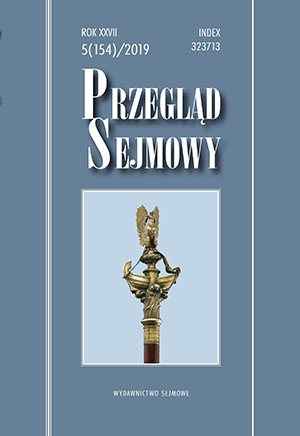Konkluzja sejmu konwokacyjnego 1733 roku. Przyczynek do refleksji nad kryzysem staropolskiej demokracji deliberacyjnej
The conclusion of the Convocational General Sejm of 1733. A contribution to the reflection on the crisis of an old-Polish deliberative democracy
Author(s): Tomasz KucharskiSubject(s): Law, Constitution, Jurisprudence, Political history, Social history
Published by: Kancelaria Sejmu
Keywords: Polish-Lithuanian Commonwealth; old-Polish General Sejm; old-Polish interregnum; deliberative democracy; parliamentary procedures;parliamentary debates;
Summary/Abstract: An article is devoted to the proceedings of a General Sejm session in the interregnum of 1733 (so-called convocational Sejm). The reflection is focused on actions of the archbishop of Gniezno — Teodor Potocki, at the time the prime senator and the president of the government. Achieving his political goals required to conduct a Sejm session smoothly. Potocki wanted to enact the law that would exclude political opponents of Stanisław Leszczyński in the future election. To ensure this and neutralize political rivals, the archbishop decided to break old-Polish parliamentary rules, consequently blocked the free discussion and refused to accept dissent announced by deputies. It caused an enormous political crisis, led to the questioning of the Sejm resolutions and, finally, to a failure of Leszczyński’s candidacy. The main purpose of the article is to show that the old-Polish mechanisms of the political system can be seen as feudal “deliberative democracy” based on freedom of political debate, unanimity in enacting laws, and weak government. By using an example of the Sejm in 1733 and its failure, the author tries to assess the causes and mechanisms of the crisis of old-Polish parliamentarism during the liberum veto era.
Journal: Przegląd Sejmowy
- Issue Year: 2019
- Issue No: 4
- Page Range: 27-48
- Page Count: 22
- Language: Polish

